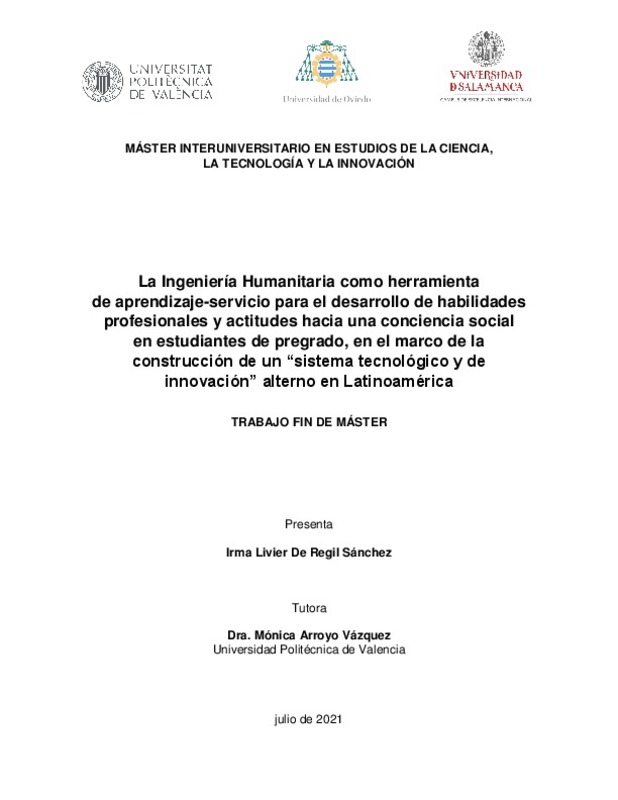

La Ingeniería Humanitaria como herramienta de aprendizaje-servicio para el desarrollo de habilidades profesionales y actitudes hacia una conciencia social en estudiantes de pregrado, en el marco de la construcción de un sistema tecnológico y de innovación alterno en Latinoamérica.
RiuNet: Repositorio Institucional de la Universidad Politécnica de Valencia
JavaScript is disabled for your browser. Some features of this site may not work without it.
Buscar en RiuNet
Listar
Mi cuenta
Estadísticas
Ayuda RiuNet
Admin. UPV
La Ingeniería Humanitaria como herramienta de aprendizaje-servicio para el desarrollo de habilidades profesionales y actitudes hacia una conciencia social en estudiantes de pregrado, en el marco de la construcción de un sistema tecnológico y de innovación alterno en Latinoamérica.
Mostrar el registro completo del ítem
De Regil Sánchez, IL. (2021). La Ingeniería Humanitaria como herramienta de aprendizaje-servicio para el desarrollo de habilidades profesionales y actitudes hacia una conciencia social en estudiantes de pregrado, en el marco de la construcción de un sistema tecnológico y de innovación alterno en Latinoamérica. Universitat Politècnica de València. http://hdl.handle.net/10251/172690
Por favor, use este identificador para citar o enlazar este ítem: http://hdl.handle.net/10251/172690
Ficheros en el ítem
Metadatos del ítem
| Título: | La Ingeniería Humanitaria como herramienta de aprendizaje-servicio para el desarrollo de habilidades profesionales y actitudes hacia una conciencia social en estudiantes de pregrado, en el marco de la construcción de un sistema tecnológico y de innovación alterno en Latinoamérica. | |||
| Autor: | de Regil Sánchez, Irma Livier | |||
| Director(es): | Muñoz Rodríguez, José Manuel | |||
| Entidad UPV: |
|
|||
| Fecha acto/lectura: |
|
|||
| Resumen: |
[ES] Ante la pandemia por la COVID-19 se hizo evidente y se recrudeció la brecha tecnológica existente entre la población global; esto detona la necesidad de preparar a los futuros profesionistas para atender la urgencia ...[+]
[EN] In the face of the COVID-19 pandemic, the technological gap between the global population became evident, and worsened; This triggers the need to prepare future professionals to address the urgency of having an ...[+]
|
|||
| Palabras clave: |
|
|||
| Derechos de uso: | Reserva de todos los derechos | |||
| Editorial: |
|
|||
| Titulación: |
|
|||
| Tipo: |
|






